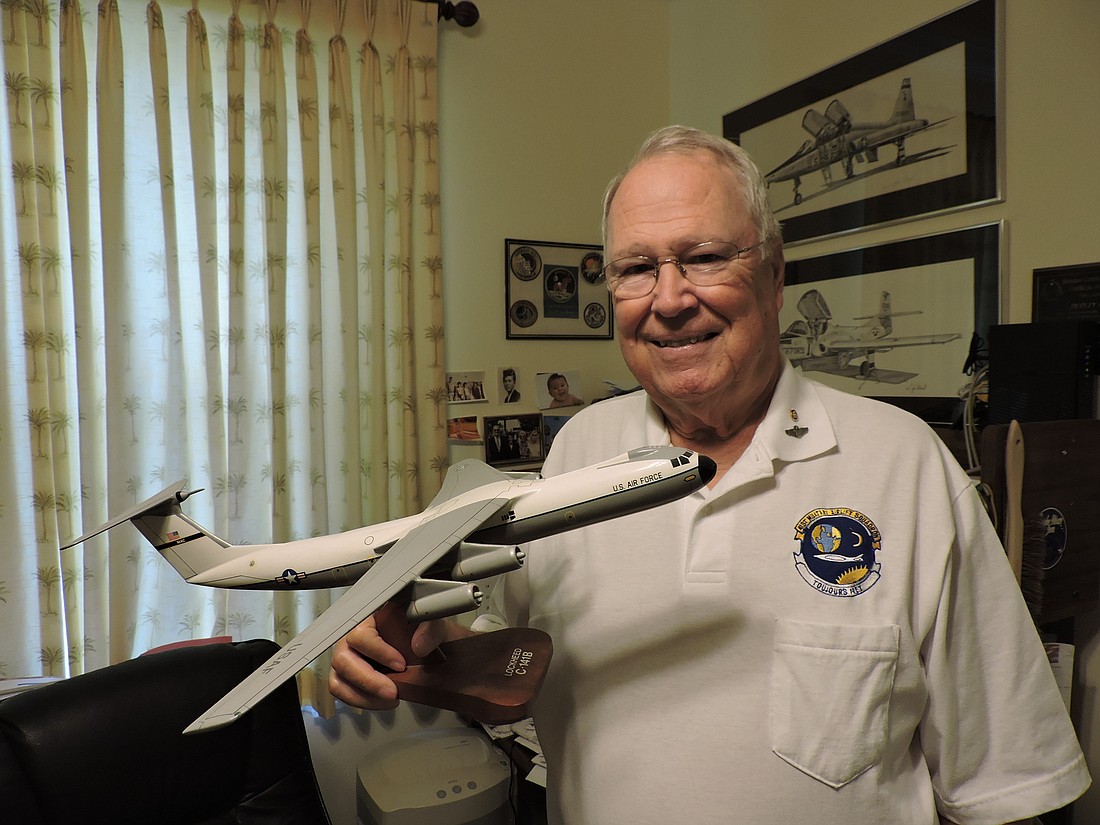- November 15, 2024
-
-
Loading

Loading

Sigrid Waters wore a sly smile as I sat down next to husband, Lee, who has about to tell me some of his military stories at their Country Creek home.
She excused herself as he began to speak, and as she left the room, she looked back at me and said, "I've heard them all."
That's part of the deal when you've been married to a retired career soldier for 50 years. They celebrated their 50th on Aug. 12.
I'm sure for Sigrid, it's like hearing those glory days stories —whether that involves high school football, summers at the beach or war stories — a million times.
But for those of you in our community who haven't met Lee Waters, hearing those stories for the first time is fascinating.
We have so many oil wells of information among our seniors, and we certainly don't tap into them enough. Spending 90 minutes with the 77-year-old Waters was enough to know he should be signed up by our school system to recount history. Or perhaps our new library — when it is built adjacent to Premier — will have a regular speaker series for those such as Lee to share their wisdom.
Although he didn't have the amazing "shot down" stories of some of his contemporaries, Waters had some amazing experiences during his time with the Air Force.
He was a U.S. Air Force command pilot who flew seven different kinds of aircraft during his career. One of his assignments was to fly three Presidential and Vice Presidential limos in support of the trips they made. Among the cars he had flown was the Lincoln Continental convertible in which President John F. Kennedy was riding when he was assassinated in 1963, although he didn't deliver it that specific trip.
Waters was a pilot on one of six crews specifically trained to fly nuclear weapons from one base to another. He also spent time in command of a Strategic Air Command nuclear Titan II launch facility in Kansas.
"I used to babysit bombs," he said with a laugh.
Eventually, he became chief of operations and training at Rhein-Main Air Base at Frankfurt International Airport for three years.
Waters flew a C7A Caribou aircraft during his deployment to Vietnam from March 1967 to March 1968 during the Tet Offensive.
"We supported the Green Beret camps," he said. "We got mortared and drew rocket fire a few times and we picked up a lot of bullet holes. We were landing on unimproved landing strips, off-loading cargo, mostly food, and sometimes bodies."
However, one of his most hazardous flight was not in a war zone.
It was 1971 when Waters was assigned to pilot a Lockheed C-141 Starlifter from Torrejón Air Base in Spain to Dover Air Force Base in Delaware to unload a shipment of explosives.
While over the Atlantic Ocean and three hours from the mainland, trouble emerged.
"All the flight control panel lights came on," Waters said. "And my load master (one of the six crew members aboard) radioed (from the back of the plane) that 'We've got hydraulic fluid spraying all over the place.'"
Waters said hydraulic fluid is very explosive when it is in a mist and it was covering oxygen shutoff handles. It was a recipe for a massive explosion.
Although Waters wanted more information from his crew, all he heard was a voice screaming, "Oh my God, we're going to die."
Waters called in the mayday situation and dealt with a crew that wanted to parachute out, even though he kept telling them their chance for survival would be better if they stayed. They listened to him.
The plane was rerouted to McGuire Air Force Base in New Jersey and Waters managed to land when one of his crew members was able to manually lower the landing gear.
"It looked like all the emergency vehicles from the state of Jersey were waiting for us," Waters said.
It was just one of his many stories, all intriguing when heard for the first time.
Sigrid poked her head out of a doorway to see if her husband was still telling stories, and it sparked a story he had about her.
A stewardess, Sigrid met Lee is Anchorage, Alaska as they both had arrived there on their respective flights. She lived near Kennedy Airport in New York City at the time and he lived across the Hudson River in New Jersey. They started a tough courtship as they both were flying all over the globe.
"I landed in Japan one time just as she was taking off," he said.
Eventually, they got married and went on to have two children and two grandchildren.
Meanwhile, Waters survived 14 electrical or engine fires on his planes over the course of his military career.
"They didn't have the time where the maintenance workers could handle all the write-ups," he said. "But you were confident in your abilities and your crew's abilities."
Waters, a 1965 Purdue University graduate, would have been happy to tell the stories about all those fires, but 90 minutes had passed and it was time to go. He summed things up by saying he chose to fly transport planes because he knew the fighters would get shot at a lot more, and because he could see the world making deliveries.
"I got my hair cut in Tokyo every two weeks," he said about one point in his service in Germany. "I got my clothes tailored in Montevideo, Uruguay.
"And I would pick up fresh shrimp in Charleston, S.C., and bring them back to Rhein-Main. 'Hey, I've got ice-cold shrimp.' I got kind of popular."
Now that's another story I would like to hear.